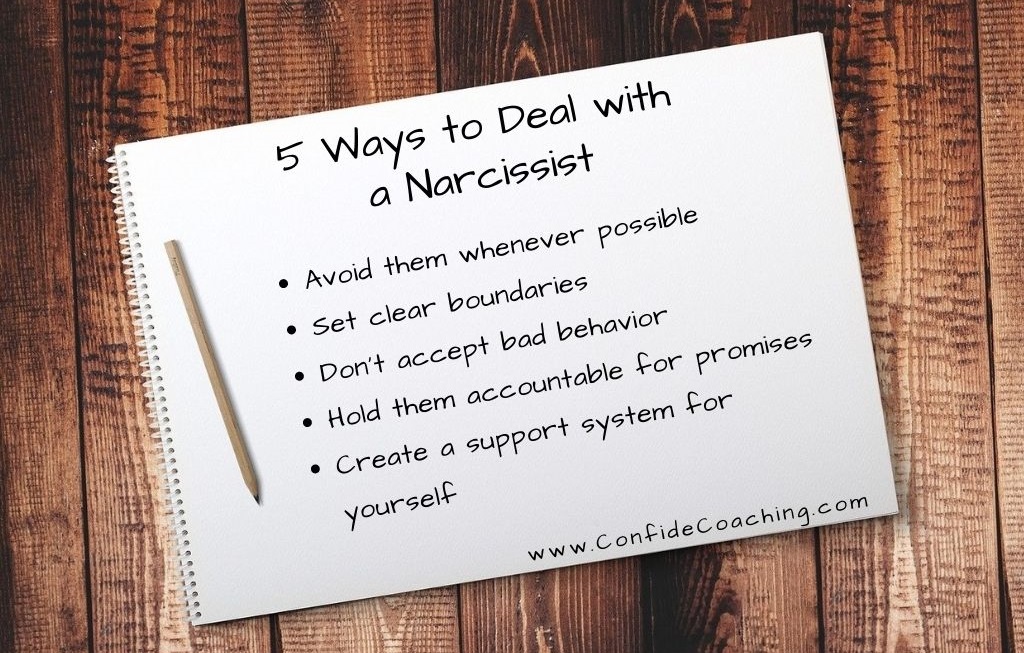
All of us have had to endure the toxic behavior of narcissists at some point in our lives, and it’s no secret that engaging with them can be a difficult endeavor. Narcissism is a personality disorder characterized by an exaggerated sense of self-importance, requiring constant adoration from others and lacking empathy for other people’s feelings or issues.
As difficult as narcissistic individuals may be to deal with, there are strategies that you can use to manage your interactions with them effectively. From establishing boundaries and having realistic expectations to using assertive communication and seeking professional help if needed, this article will discuss how best to handle narcissists and preserve your own mental well-being.
Overview of narcissistic traits
Narcissistic Personality Disorder (NPD in the Diagnostic and Statistical Manual of Mental Disorders, 5th edition) that includes a deep-rooted sense of self-importance, insatiable craving for admiration, and disregard for the feelings of others. People with a narcissistic personality disorder often have difficulty maintaining healthy relationships as they display aggression (mostly idle threats) which causes feelings of anxiety and low self-esteem in those around them. This is why having a narcissistic spouse can be a particularly difficult situation.
It is important to recognize narcissistic traits so that you can better understand how to handle toxic people in your own life. However, narcissists may not always display all of the below traits, and some may have more mild forms of narcissism than others.
Some common narcissistic traits include:
- Delusions of grandeur; a grandiose sense of life mission.
- The constant need for attention and validation.
- Sense of entitlement.
- Taking advantage of others.
- Manipulation or emotional abuse
- Lack of empathy.
- Arrogance and self-centeredness.
- Defensiveness.
- Possessiveness.
- Strong sense of superiority over others; a self-centered, important person
Dealing with a narcissist can be difficult and draining, but it is possible to manage the situation effectively. Ultimately, understanding what makes a narcissist tick and knowing how to handle their behavior can make all the difference in achieving successful interactions with them going forward.
Recognizing the warning signs of a narcissist

Gaslighting is sneaky tactic used by narcissists to make you question your trust in your own perception.
Recognizing narcissistic personality traits early on is essential for protecting oneself from narcissistic abuse. While narcissistic characteristics can range in severity, there are certain behaviors that can be indicative that you are dealing with a narcissist. It should be noted that their lack of self consciousness many times makes them unaware of their own behavior.
Inflated sense of self-importance
One of the most common narcissistic expressions is an inflated sense of self-importance. Narcissists tend to think highly of themselves, overestimate their abilities, and demand recognition and admiration from those around them.
Taking credit for the accomplishments or successes of others
They often take credit for the accomplishments or successes of others and may make grandiose claims about themselves without any evidence or facts to back up these claims. In extreme cases, narcissists may be prone to exaggerating stories or fabricating tales in order to make themselves seem more important than they actually are.
Lack of empathy
Narcissists struggle with empathy, as they often lack the ability to understand the feelings and perspectives of those around them. This inability to empathize can lead a narcissist to manipulate conversations and relationships with selfish motives in mind, often disregarding how their words and actions affect others’ mental health.
Inability to handle criticism or receive negative feedback
Narcissists will react very defensively when faced with even the most constructive criticism or disapproval from others, feeling threatened by any opinion that does not align with their own beliefs or opinions. In extreme cases, this could lead to narcissistic rage, an intense outburst of anger triggered by perceived threats or criticism directed at the narcissistic person’s ego or self-esteem.
“When someone shows you who they are, believe them the first time.” – Maya Angelou
Understanding the motivations behind narcissistic behavior
When dealing with a narcissist, it is important to understand the motivations behind their behavior.
Narcissistic people are driven by feelings of inferiority and low self-worth but seek to mask these negative feelings by appearing overly confident and self-assured. This false sense of superiority enables them to feel powerful and in control, which feeds their need for admiration.
It is important to remember that while narcissists often appear arrogant and lacking empathy, they are not necessarily malicious or cruel; they just want to be seen as special and will go to great lengths to protect their fragile sense of self-worth.
It is also common for them to become fixated on certain people and may feel threatened if these individuals do not show them the attention and respect they crave.
Setting boundaries with narcissists
Narcissism comes with a great deal of entitlement. A narcissist will feel entitled to your time, space, feelings, and support. They expect you to go where they want, do what they want, and always make sacrifices on their behalf.
One of the most important strategies for dealing with a narcissist is establishing clear boundaries. Set boundaries around topics such as personal space, finances, decision-making power, communication styles, behaviors such as name-calling or insults, and other areas where you feel vulnerable. Putting the right boundaries in place is crucial to protecting your mental health.
Make sure that you communicate your expectations clearly yet assertively so that a narcissist is aware of where they stand in relation to you. However, be prepared that a narcissist will keep pushing your boundaries to see how far they can get.
Remember that boundaries serve to protect you and your self esteem from narcissistic abuse. While it may feel awkward and scary if you’ve never done this before, setting firm boundaries is one of the best strategies for dealing with a narcissistic person.
Here are a few tips on how to set boundaries when you deal with a narcissist:
- Be clear and concise when communicating your boundaries. Tell them which topics are off-limits by using phrases like “we are not here/going to discuss that” or “this subject is off-limits and none of your concern.”
- Do not make excuses or justifications for why you are setting certain boundaries. Do not explain yourself. If you start explaining, you are losing. A narcissist will always try to get you on the defensive. It’s a tactic used to guilt trip and gaslight you. Remember, your feelings and decisions are justified, and your don’t have to explain your own behaviors.
- Be assertive in enforcing your boundaries. Have a list of phrases that you repeat every time your boundaries are being tested. Say things like “Why is this important do you?” or “How is this your concern?”
- Do not hesitate to walk away or end the conversation if the narcissistic individual does not respect your boundaries. Sometimes the best thing you can do is to avoid them.
While establishing boundaries is an effective strategy for dealing with narcissists or any other people with personality disorders, having realistic expectations about how much change will occur as a result is key to avoiding disappointment down the line.
Having realistic expectations when dealing with narcissists

Most narcissists think the rules do not apply to them. Set your expectations accordingly.
Another important strategy for dealing with narcissists is to be realistic in your expectations of them. Narcissists often do not live up to their promises and can be very difficult to please. As such, it is important to manage your expectations so as not to set yourself up for disappointment. Keep your expectations realistic, and be prepared for the narcissist to let you down.
Another way to manage expectations when dealing with narcissists is by keeping conversations focused on the present moment rather than the future. As narcissistic individuals tend to be unreliable and unpredictable, expecting them to act differently in the future can lead to disappointment.
Instead of placing unrealistic hopes on them and becoming frustrated when they do not live up to these expectations, focus your conversations on what is happening now or what can be done today. Just don’t expect them to own their part – narcissists rarely apologize and mean it. Don’t underestimate the narcissist’s ability to take credit and give blame.
Active listening
It can be beneficial to practice active listening when dealing with a narcissist. Active listening involves paying attention closely to what the other person is saying without interrupting or judging them; this will help reduce tensions between both parties, prevent unnecessary arguments from escalating further, and even potentially help narcissistic individuals better understand individual differences from a perspective outside of their own narcissistic worldviews.
Don’t accept harmful behaviors
It’s unwise to argue with a narcissist. Direct confrontations often turn nasty since they’re not opposed to bullying, not to mention narcissists tend to be extremely sensitive to criticism. But that’s not to say you shouldn’t speak up or stand up for yourself. Moreover, calling them out in front of their social circle has a greater effect than one-on-one conversations (because they can always deny what they said or did).
Yes, sometimes the appropriate response is to pick your battles and walk away for the benefit of your own mental health. Like establishing boundaries, you need to speak up for yourself and get specific about the behaviors you will not tolerate.
As they completely lack empathy, narcissists are too self-absorbed to see how their behaviors impact others, so it’s important to clue them in. Also, remember that you have choices too. You can always break contact should they refuse to regulate their behavior.
It’s important to remember that if you feel overwhelmed by a narcissistic husband or wife in your life, reach out for support from friends or family members. Taking care of your mental well-being should always come first when dealing with any type of difficult people.
Assertive communication strategies for dealing with a narcissist
Assertive communication can help you effectively handle narcissists and protect yourself from their abusive behavior.
When dealing with a narcissist, it is important to be direct, respectful, and clear in your communication style. Being assertive means you convey your boundaries and expectations in a calm and direct manner without being aggressive or passive-aggressive.
Staying calm and respectful is the opposite of what a narcissist expects of you when your buttons are being pushed. It is an effective way to communicate that their behavior is not acceptable.
If this is a boss or co-worker, follow-up any one-on-one conversations with a summary email to document interactions.

Helpful questions to disarm narcissists
Use questions like “how do you mean? ” to turn the conversation around and avoid falling into the trap of having to explain yourself. Don’t give them ammunition – anything you share will eventually be used against you to either humiliate or manipulate you. They are guns — don’t give them ammunition.
Being assertive also means using “I” statements rather than “you” statements when communicating with a narcissist. For example, instead of saying, “You are always so rude!” say something like, “I feel disrespected when you speak to me in that way” instead. This allows for more effective communication without resorting to name-calling or accusations, which can further escalate the situation. Always try to avoid direct confrontation.
Insist on immediate action, not promises
Narcissists aren’t particularly good at taking accountability, but they’re great at making promises to do better or be better. While they might seem sincere at the moment, their motivation quickly falters once they get what they want.
Your needs, thoughts, preferences, and feelings matter. Ask for what you want and stand your ground. Giving in to their demands weaponizes them, making it more challenging to deal with them in the long run. Also, know when to move on. For instance, people with narcissistic personalities tend to be verbally and emotionally abusive and in some cases are the main perpetrators of domestic violence.
A last resort tactic
While fighting fire with fire is not always the best tactic, as people with Narcissistic Personality Disorder can be particularly cunning, sometimes the only line of defense you have to a threat to your reputation or career is to use information against them.
Because narcissists have such a need for admiration, the threat of public humiliation can actually keep them in their place and on their best behavior. If you have a piece of information that could have them “fall from grace,” threatening to make it public to a co-worker or a family member just might do the trick. It may not be a permanent fix, but it slow down or pause the narcissistic cycle.
Do not use this method if your wife or husband is a narcissistic bully and has a history of violent behavior.
Create a support system
Anyone who’s lived with a narcissist can tell you that it’s an emotionally draining experience. It can flare up your insecurities and self-doubt. So, it’s crucial to build healthy relationships and have a support network of people you trust around you. Moreover, a toxic relationship that involves a narcissist are often dysfunctional and can wreak havoc on your mental and emotional health.
Seeking professional help if needed to deal with a narcissist
If you find yourself struggling to deal with a narcissist, it is important to seek the help of a professional to help protect your mental health. Because narcissists often lack the ability to empathize with others, it can be difficult to understand their feelings and perspectives.
Narcissists may also react very negatively when faced with even the slightest criticism or disapproval from others, feeling threatened by any opinion that does not align with their own beliefs or views.
An experienced life coach or a therapist can help you develop strategies to cope with narcissists in your personal and professional life and provide support, encouragement, and guidance.
Coaching can teach you how to recognize harmful behaviors and give you the tools and skills you need to set healthy boundaries and build a strong support system to protect yourself and your mental and emotional well-being.
Concluding remarks on how to handle narcissists effectively
Dealing with a narcissist can be difficult, but it is possible to handle them effectively. By learning to recognize the warning signs of narcissists and understanding the motivations behind their behavior, you can take proactive steps such as setting boundaries and using assertive communication that can help you protect yourself from narcissistic manipulation.
It is also important to remember that no one is completely immune to the influence of narcissists, so working with an experienced life coach may be beneficial in learning how best to protect your mental well-being and build a strong support network, whether that be a healthy relationship with a family member, or online support groups. With these strategies in place, you will gain the confidence needed to stand up for your rights and effectively manage these difficult personalities.
Just remember, when dealing with narcissists, don’t expect fairness. People who tolerate narcissistic behavior do so, hoping they’ll change–especially if it’s a family member. You can’t change people. They have to recognize their faults and take active measures to be different.
p.s. – Need more strategies on how to deal with the Narcissist in your life? Schedule a free call and we’ll see if we’re a fit for working together!

Paul Strobl, MBA, CPC
Owner of Confide Coaching, LLC
Paul is a Master Life Coach for individuals, executives and business owners. Originally from Houston, Texas, he has been location independent for most of his adult life. He currently resides in the Rhodope Mountains of Bulgaria near the Greek border with his brilliant wife, 13-year-old stepson (officially adopted in 2021!) and a Posavac Hound rescue.

